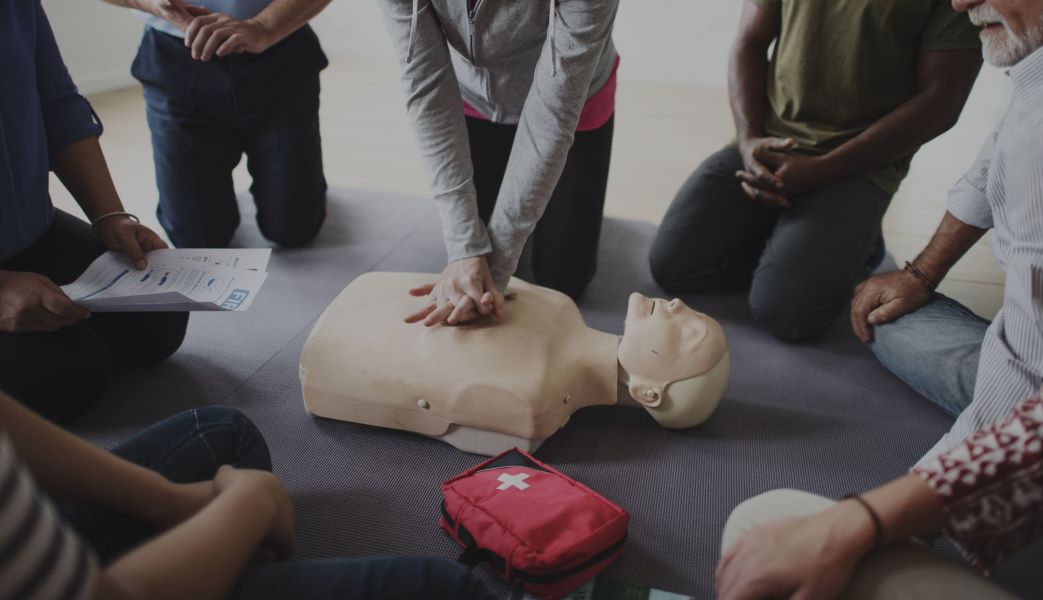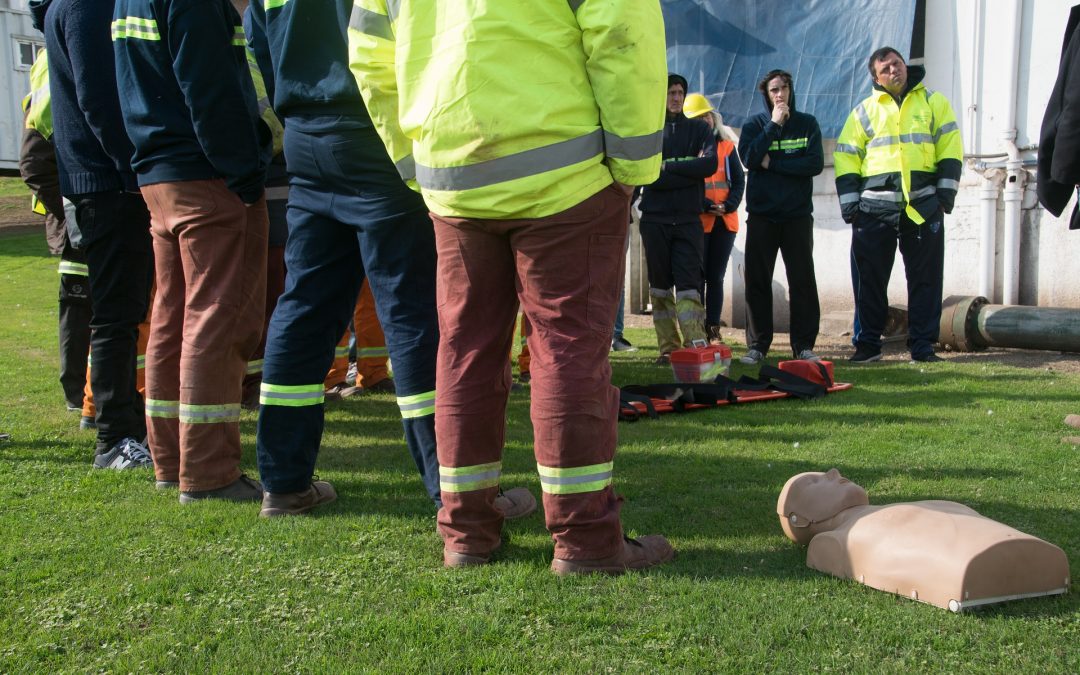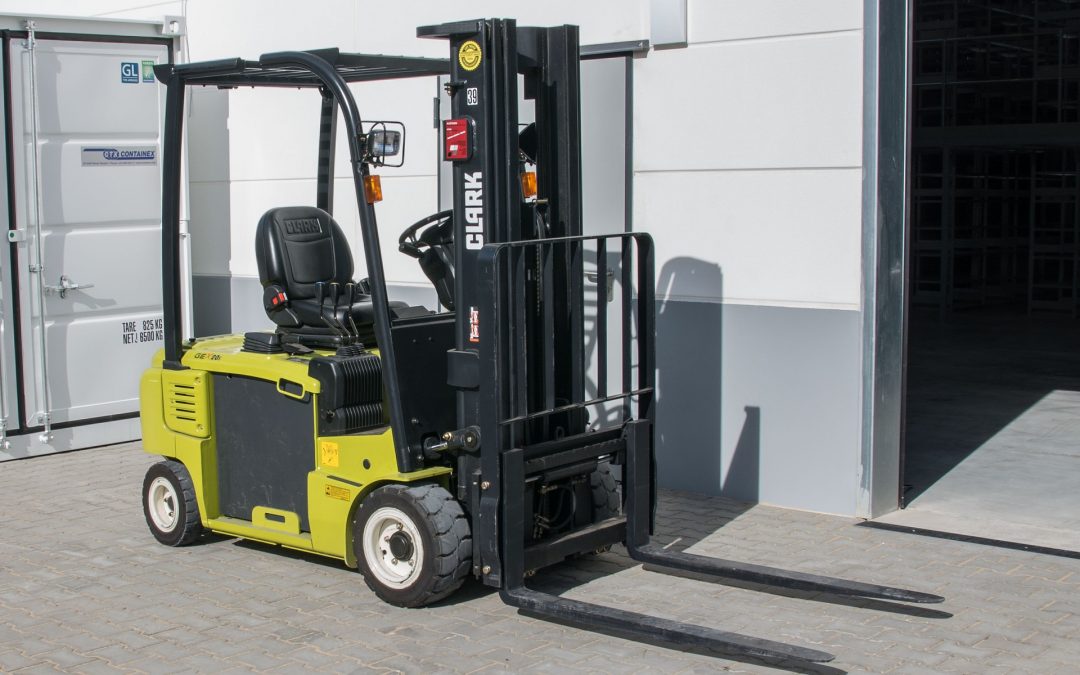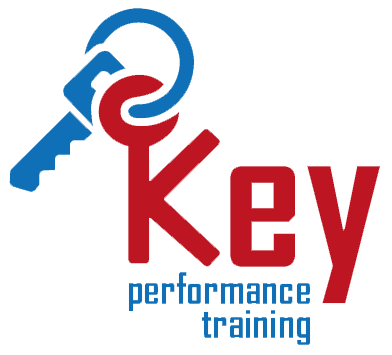
by Richard Colligan | Jan 12, 2023 | Our News, Training courses
We are delighted to announce that the date for the next First Aid Course has now been confirmed.
Our Ofqual accredited course “Emergency First Aid At Work” is a one day course designed for workplaces that fall into a low risk category.
This popular course is taking place in our dedicated training centre in Swindon and it’s running on Friday 10th February 2023.
What You Will Learn
- The roles and responsibilities of an emergency first aider
- Health and safety (First Aid) regulations
- Assessing an incident
- Managing an unresponsive casualty
- Cardiopulmonary Resuscitation and defibrillation
- Recovery Position
- Choking
- Seizures
- Shock
- Wounds and Bleeding
- Minor injuries
- Cuts, grazes and bruises
- Minor burns and scalds.
As well as leave with a nationally recognised certificate that lasts 3 years, we’ll also provide you with lunch and refreshments.
Spaces are limited so early booking is recommended to guarantee a place.
Contact us on 01793 975353 or david.gearon@keyperformancetraining.co.uk to book or for more information.

by Richard Colligan | Apr 22, 2022 | Employment & skills, Our News, Training courses
Our friendly trainers ensure that you receive the best value, most up to date, regulated and quality assured First Aid training available. The courses that we deliver are designed to be informative, fun and engaging. Our aim is to create an optimum learning environment, with our First Aid training courses being run in-house, at your workplace, or at a location to suit you.
Regulated by Ofqual, under their Regulated Quality Framework (RQF), accredited by the FAA and FutureQuals – our courses provide accountable, quality assured, practical knowledge, backed-up by real-world experience from our trainers. All courses meet HSE guidelines All our trainers are Disclosure & Barring Service (DBS) checked and we are more than happy to supply copies of their certificates prior to your course commencing.
HSE recommended
Our First Aid curriculums are updated regularly and our trainers undergo Continuous Professional Development (CPD), so you can be confident that all our courses will keep your staff up to date with best practices, as well as the latest guidelines from the Health and Safety Executive. If you need something more bespoke, our courses can also be tailored to meet your specific requirements, with Skillbuilder Courses added to the package, to maximise the value of your training.
Get the most out of your training
Our Skillbuilder Courses are specialist courses, designed to maximise your First Aid skill-set with specific training. They can be taken individually, or as a suite, to build on existing skills. They can also be included as part of a training package, when other courses are booked, to add real value and cost-effectiveness to your training.
Guaranteeing the quality of your training
All our trainers are qualified Internal Quality Assurance (IQA) Assessors, meeting the First Aid Awarding Organisation Forum’s Assessment Principles for First Aid. These Assessment Principles are the minimum requirements that are expected of regulated training providers in the UK.
Costs you will like
With prices starting at £28/person, we package the best training into the most cost-effective solution for you, giving you the best solution for your budget. All courses are for a class size of up to 12 delegates and we currently offer a 10% discount for all courses booked 2 months or more in advance.
Find out more – Call 01793 975 353
Workplace Courses – In-house, or at a location to suit you
- First Aid at Work
- Emergency First Aid At Work
- Outdoor + DofE Courses – Training for the outdoors and expeditions
- Outdoor First Aid
- DofE Expedition First Aid
- Paediatric Courses – Training for schools, groups and nurseries
- Paediatric First Aid
- Emergency Paediatric First Aid
- Refresher + Re-qual Courses – Keep your knowledge and skills up to date
- First Aid Refresher Training
- First Aid at Work Requalification
- Skillbuilder Courses – Maximise the value of your training
- Management of Anaphylaxis
- CPR + AED (Defibrillation)
- Catastrophic Bleeds
- Oxygen Therapy Administration
The syllabi for these courses are as recommended by the Health and Safety Executive (HSE) and are fully compliant with The Health and Safety (First-Aid) Regulations 1981. We use the latest training aids to deliver the best quality training to you
Course Location and Duration
These courses can be run in-house, or at a location of your choice for up to 12 delegates. The HSE require various contact hours for these courses, which can be delivered back-to-back, or broken down into individual days/evenings to suit you – as part of a training package, or as standalone courses. Delegates must attend all sessions to be eligible for assessment, which is done by continuous observation and questioning during the course.
Who Should Attend?
All those who wish to develop their First Aider skill-set and are easily accessible to other employees in the workplace, school or group.
Qualifications
All courses provide recognised, certificated awards and are regulated by Ofqual under their Regulated Quality Framework (RQF) and accredited by the FAA.
Find out more – Call 01793 975 353

by Richard Colligan | Mar 17, 2022 | Employment & skills, Industry news, RTITB, Training courses
It is reported that overall accident rates are lower in workplaces where the wider workforce participates in health and safety and employees feel they have a say. The awareness of the risks of slips and trips, for example, is supposedly greater (62%) where the workforce is consulted on health and safety issues, than when there is no involvement (28%).
What employers with workplace transport operations can take from this, is that to reduce risk of incidents, it’s important for lift truck operators to understand their role in health and safety and feel they can actively contribute. In research, 77% of the workforce felt encouraged to raise concerns in a good health and safety climate to 20% who felt encouraged to do so in a poor health and safety climate.
Forklifts are one of the most commonplace types of equipment in logistics and warehouse operations, yet they are also among the most dangerous – it is suggested that 8,000 workplace incidents involving lift trucks are reported annually. With this in mind, your forklift operators may be some of the best positioned employees to understand workplace risks related to material handling and to take an active role in contributing to health and safety improvements.
So, what can employers do to help engage lift truck operators in health and safety more and positively influence their behaviour?
- Communicate the impact of incidents
Having a culture where incidents are never just an inevitable part of the job is key. Moreover, operators should have a clear awareness of the potential impacts of a lift truck incident occurring. At the most serious end of the spectrum, this can include life-changing and fatal injuries.
To tackle these subjects effectively, two-way communication is needed between trainers, health and safety managers and compliance managers, and their lift truck operators. What this looks like will be different depending on your organisation’s size and culture. However, a lift truck operator training environment is one good place to have these conversations, especially as regular training of operators is required for compliance.
For novice operators, the eTruck UK forklift and reach truck theory eLearning solution from RTITB helps support this, and encourage behaviour change around risk. Rather than a traditional presentation-led style of training, eTruck tells the story of a lift truck accident and the chain of events leading up to it. Operators must engage with the story to understand and anticipate when, why and where the accident will occur. This gives a greater understanding of safe operating practices and the impact of an incident on the wider operation.
- Educate on the role of Managers and Supervisors
It would be easy for operators to feel that should any incident occur, that it’s not entirely their fault, and it is true that their Managers and Supervisors have a significant role to play. Incidents often occur as a result of poor or non-existent supervision, so to reduce risks and comply with the law, those in these senior roles must be correctly trained, just as operators must be correctly trained.
However, operators must be made aware that they do have a level of accountability and therefore must always operate to the safety standards delivered via their lift truck operator training and follow the organisation’s rules and processes around health and safety.
- It all starts with training
Employers must remember that for compliance and safety, lift truck training should always be the first step. It is vital for not only educating operators on how to use and work around lift trucks, but also how to reduce risks to themselves and others.
There is a mandatory level of lift truck operator training required for compliance, and it is crucial to keep this up to date with refresher training or conversion training (if required). This is an essential for employed staff, as well as temporary and contract workers. For safety, only correctly trained staff should be given an Authorisation to Operate equipment.
However, businesses should always continue to undertake regular risk assessments and assessments of operators to ensure optimum safety practices and deliver remedial or additional training as and where needed.
RTITB Accreditation could support safety in your operation.

by Richard Colligan | Mar 11, 2022 | Employment & skills, RTITB, Training courses
After successfully completing your forklift truck training, you will understandably be eager to get out and put your new, hard-earned skills into practice. Forklift driving is a career path where you are constantly learning and acquiring new skills as you become more experienced. Obtaining your forklift licence is just the beginning of your journey. So how can you be a better forklift operator?
Never Skip Checks
Forklift trucks can be extremely dangerous machines to operate. Always check the forklift truck over before starting a shift, even if a driver has just been using it immediately before you. We all know the feeling of a manic Monday morning, but it is vital that you take the time to go through a safety checklist before operating a forklift, each and every time.
Be Disciplined About Distractions
It’s always the tips that sound so obvious that are the easiest to disregard. It seems clear to say that driver’s should avoid any and all distractions while on the truck, but being disciplined about distractions can be easier said than done. Maintaining focus at all times is paramount to forklift truck driving safety, both for you and for those around you.
Keep Yourself Warm
Driving in cold conditions dramatically reduces your reaction times, so it’s best to make sure you are dressed appropriately for both the weather and warehouse conditions. This is especially important if your work takes you outside. Layers that can be easily added to over the course of the day are an ideal solution, and could make all difference in the safety of your forklift operating.
Ask For Help
It can sometimes be difficult to ask for help, but in forklift truck driving, there are no stupid questions. Always communicate, always make sure, and always double check. It is better to ask and eliminate all doubt, and all safety risks along with it. This way, you are in total control of the safety of your workplace.

by Richard Colligan | Mar 2, 2022 | Employment & skills, Industry news, RTITB, Training courses
Not All Your Time Will Be Spent Driving Forward
In fact, the vast majority of your time spent in a training session will be in reverse. Learning how to safely manoeuvre a forklift truck to back round corners, or to reverse into tight spaces is an underestimated skill. You will also learn how to move round the warehouse safely in every direction, while carrying a variety of different loads.
Previous Driving Experience Is Not Essential
Don’t be put off if you don’t have forklift experience already. The truth is that you don’t even need to hold a car driving licence to be able to train to drive a forklift truck. You will learn everything you need to know about how to safely drive a forklift on one of our courses, no matter your experience level. All you need to do is show up and come with a positive, can-do attitude.
Forklift Driving Is Different To Any Other Driving
Forklift trucks use their rear wheels to steer, and they have a 3 point suspension system. Simply put, this means that they are very different to handle than any other vehicle. For this reason, you will spend a good amount of time learning the theory and safety components of driving a forklift truck, as well as practical hands on sessions.
For more advice about Key Performance Training’s forklift driving courses call us on 01793 975353.





